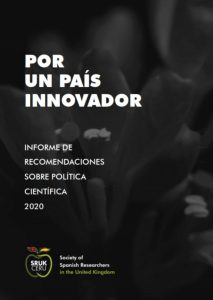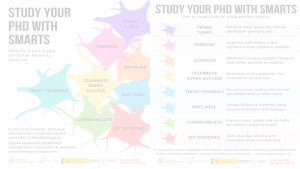The current pandemic has reminded us of the importance of science and research, but also its struggles in places like Spain [1]. Countries with a strong and consolidated innovative capacity are able to withstand crises – such as the current health crisis [2] – and face future challenges better [3,4]. Change is possible, but a political commitment is needed to tilt our production model towards R&D, regardless of the political party in power. If achieved, this commitment could help us to reap its fruits in the future and compete with other countries that invest (not spend) much more on research.
From the Society of Spanish Researchers in the United Kingdom (SRUK/CERU), we have just published our report Por un País Innovador (i.e., For an innovative country). This is a cross-sectional document with recommendations that we believe could be useful to improve the Spanish R&D system, based on our experience in both countries. This report highlights the progress made so far in Spain and suggests possible solutions for the shortcomings that still affect us.

Figure 1. Cover of the report Por un país innovador. You can download this report here.
One of the main burdens of our R&D system is the scarcity of economic resources allocated to research (1.2% of our gross domestic product or GDP in 2018) [5], which is below the European average (more than 2%) and very far from the Nordic countries, Germany, or Austria (which exceed 3%) [5]. The UK, with 1.7% of GDP (2017), has recently presented a strategy to gradually bring this figure to 2.4% of GDP in 2027 [6].
Moreover, up to 60% of the Spanish budget is in the form of loans to be repaid [7]. These are only attractive to medium-big sized companies that can risk investing in innovation and assume these loans, but they do not sustain public R&D and innovation, small businesses, or entrepreneurial initiatives – more than 80% remained unused in 2018 [7]. For this reason, at SRUK/CERU we advocate for increasing the public budget for R&D at European levels (and not at the expense of loans) so that public science can not only survive, but also grow.
On the other hand, we believe that it is essential to incorporate companies, foundations, and NGOs into the equation. These entities are key to research funding in the UK. For example, in 2018, charities contributed 1.3 billion pounds to research in biomedicine alone [8]. Here, our report highlights measures to encourage sponsorship and micro-funding through tax breaks or by encouraging investment in start-ups, among other options.
The eternal bureaucracy and lack of stability are other major problems of researchers. Calls that are not published or instances where it is not known when or whether results will go out. The continuous search for money to invest in research, the concatenation of temporary contracts, and an impossibility of planning can, altogether, bring hardship to the research career. For this reason, we demand a specific calendar of calls with sensible and stable deadlines. We are committed to excellence but, first of all, we must strengthen a consolidated research base and stabilise the scientific career in our country.
For many of us, going home is an impossible mission. As we have been advising from SRUK/CERU (like our colleagues at RAICEX [9] or CRE [10] have), Spain has a key strategic weakness in attracting and retaining talent. Not only are we unable to offer an attractive return to our own nationals, but we also find it difficult to attract international workers to work in Spain (barely 2% of our university teaching staff comes from other countries) [11]. This situation partly reflects inbreeding at universities, which ends up resorting to undercover “internal promotion” due to lack of resources, closing themselves off to foreign incorporations. The difficulty involved in the accreditation of international experience with ANECA’s current procedures, of course, does not help either. We must learn how to value the expertise of our professionals, as well as grant them a certain job stability with conditions that allow for work-life balance and salaries comparable to those offered by our neighbouring countries. In addition, there will be no competitive science if it is not inclusive. In this path of transformation, we cannot forget gender equality, the promotion of cultural diversity, and equity. Reviewing procedures for evaluating staff and projects to eradicate any bias (conscious or otherwise) is a good starting point, as well as increasing the visibility of these groups by promoting role models and organising talks or workshops on the subject.
Another important way of improvement for Spanish research is the dissemination of knowledge to the society. Science cannot be just atrezzo for a crime investigation series or a tool at the service of a few. If society does not understand science nor how it works, we do have a problem: we must strive to reach in a more engaging way those people outside the ivory towers of our laboratories and universities. At SRUK/CERU, we call for training courses in scientific communication, strengthening units of scientific culture, and programming activities that bring science closer to people (popularisation, direct participation, etc.). In addition, we (as researchers) must interact fluently with journalists and institutions to ensure that both public information and decisions have the best scientific basis. We encourage the development of structures similar to the Science Media Centre (SMC) or the Parliamentary Office for Science and Technology (POST), British examples discussed in the report.
Incidentally, our report Por un país innovador was born from an innovative and participatory process with the aim that this document triggers discussions and actions that can lead to improve the I+D+i in Spain. First, we gathered about fifteen representatives from different levels and areas of research in a brainstorming session. Secondly, in SRUK/CERU’s Science Policy Department, we drafted recommendations according to the debate held in that session. Finally, we brought our draft to another fifteen independent experts from both countries. If you would like to find out more about all this process, the report is already available on our website. This document has been published under a free licence Creative Commons, so please do feel free to share and distribute it with your friends and colleagues. You can download it here!
* * *
By Fernando Jiménez (@Fer_J1m3n3z), bioinformatician at the Maimónides Institute for Biomedical Research in Córdoba and member of SRUK/CERU Science Policy department, and Pablo Izquierdo (@pablotres14), PhD student in neuroscience at University College London and SRUK/CERU Director of Science Policy department.
More information:
- Press release: Una protesta virtual de científicos exige que se soluciones la precariedad de la ciencia española. Source in Spanish: El País. Year: 2020.
- Report: The role of research and innovation in support of Europe’s Recovery from the COVID19 crisis. Source: European Commission. Year: 2020.
- Report: Value of Research. Source: European Commission. Year: 2015.
- Press release: How important is R&D for economic growth?. Source: R&D World. Year: 2019.
- Report: Research and development expenditure. Source: Eurostat. Year: 2020.
- Informative post: Increasing the UK’s investment in R&D to 2.4% of GDP. Source: UKRI. Year: 2020.
- Informative post: Sin ejecutar la mitad del presupuesto para I+D+I del sector público estatal. Source in Spanish: Innovaspain. Year: 2019.
- Report: Research expenditure summary. Source: AMRC. Year: 2018.
- Report: Informe ATRAE. Source in Spanish: RAICEX. Year: 2019.
- Report: Informe sobre el Retorno e Incorporación de Científicos e Investigadores a España (IRICIE) . Source in Spanish: CRE. Year: 2019.
- Press release: Profesores extranjeros en la Universidad. Source in Spanish: El País. Year: 2019.




